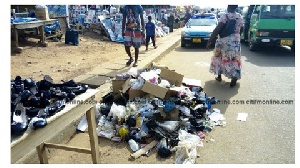Mr Mustapha Abdul-Hamid, the Minister of Information, has decried the bad attitudes of Ghanaians as the contributory factor to the country’s poor sanitation situation.
He said cleanliness is next to godliness and, therefore, urged Ghanaians to change their attitudes and avoid indiscriminate littering of the streets and drains.
Mr Abdul-Hamid said nations that were clean were not clean because their governments cleaned the streets, but they were clean because their peoples had the right mentality and did not pollute the environment.
“There is a sense that we have a responsibility towards our environment and also, there is a sense that Government helps us keep our responsibility to our environment, in other words, we have a shared responsibility to keep our environment clean,” he said.
He urged all well-meaning Ghanaians to take inspiration from the National Anthem, which highlighted the good deeds of the forbearers setting good sanitation standards and making deeper commitments towards keeping the environment clean.
Mr Abdul-Hamid said this at the Meet-the-Press encounter in Accra, on Thursday, which featured the Ministry of Water Resources and Sanitation.
The meeting afforded the Ministry the opportunity to explain Government policies and programmes on sanitation and measures to sanitise the environment.
The Information Minister said: “Cleanliness is a state of mind and a way of life,” and, therefore, charged Christians and Muslims who espoused the belief that ‘‘cleanliness is next to godliness’’ to live up to that accolade and keep their environment clean.
He said it was wrong for religious people to claim righteousness if they were unable to keep their environment clean adding; “How can we be devoted to God when we are unclean. I, therefore, urge you to walk the talk.”
Mr Abdul-Hamid noted Ghana would be a nice place to live if Ghanaians embraced the habits of good sanitation practices, adding; ‘‘Sanitation is a shared responsibility’’.
He gave the assurance that President Nana Addo Dankwa Akufo-Addo was prepared and resolute to invest heavily in the sanitation sector, in order to propel the economic growth of the nation.
Mr Joseph Kofi Adda, the Minister of Water Resources and Sanitation, said Government owed waste management companies an outstanding debt of GH¢892 million for waste management services rendered to Government agencies and Metropolitan, Municipal and District Assemblies.
According to him, the debt was inherited from the previous government accrued from the provision of landfill management services, evacuation of refuse, fumigation services, compensation to GYEEDA employees and sanitation guards as well as debts arising out of contracts with the Ministry of Local Government and Rural Development, and Metropolitan, Municipal and District Assemblies.
The Minister said the debt needed to be settled by the Government before effective delivery of services could be carried out.
However, he said, the Government had not only successfully negotiated the settlement of those debts, but had commenced payment.
“We have also made resources available for the emergency evacuation of the heaps of refuse that has piled up in Accra and other regional capitals,” he said.
The Minister assured Ghanaians that it would surmount the daunting challenges and deliver efficient sanitation services.
“We are having consultations with appropriate stakeholders to find measures to make our cities clean,” he said.
Mr Adda, therefore, charged the media to name and shame individuals who engaged in bad environmental practices.
He said Government would soon roll out a programme to construct about one million household and institutional toilet facilities to ensure that every household had a toilet facility to curb open defecation.
“We are moving from communal toilet mechanisms to household toilet structure, which, if well executed, would end open defecation at a quick pace,” Mr Adda said.
General News of Thursday, 24 August 2017
Source: GNA

















